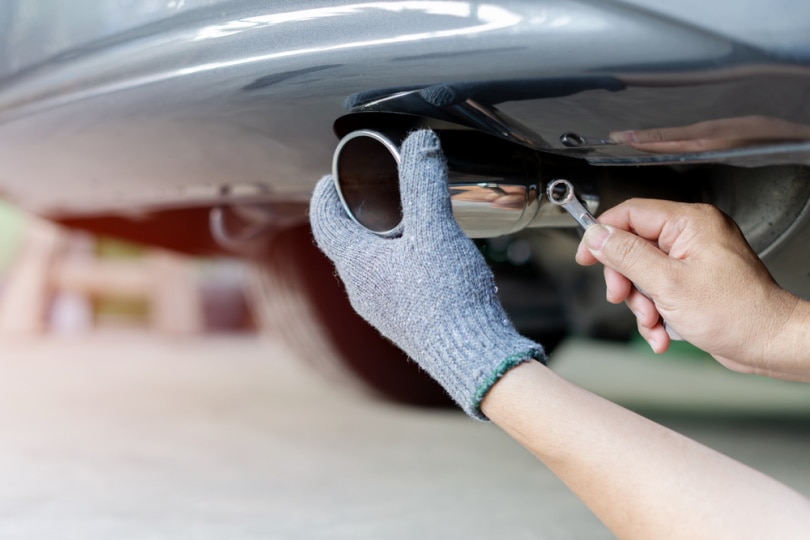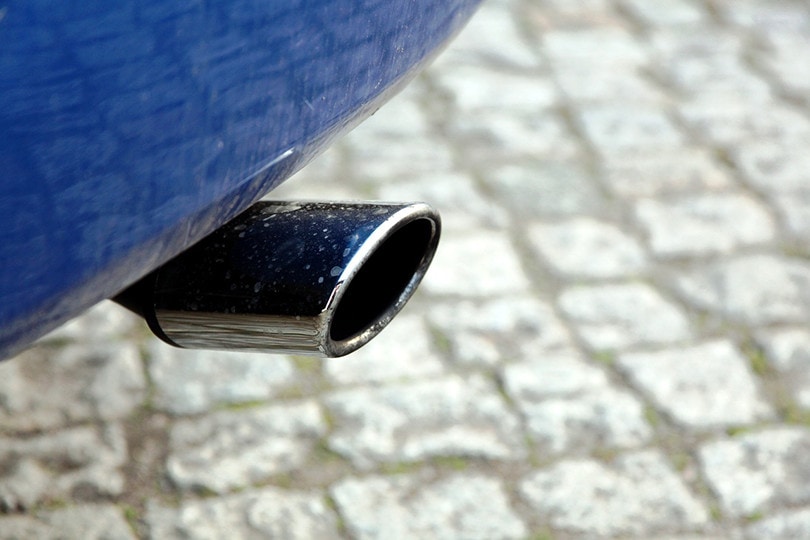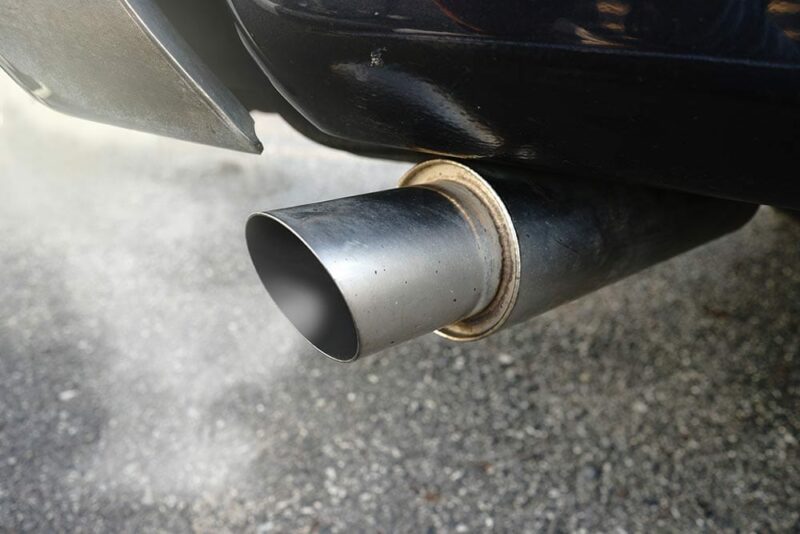What Does a Muffler Do? Facts & FAQ
-
Pete Ortiz
- Last updated:

There are thousands of tiny details in a modern-day vehicle. As for the muffler, it is a relatively simple part of the exhaust system that has two important jobs. First, it dampens engine sounds. Without it, you’ll have to listen to the motor’s noise all day long and disturb fellow drivers. Second, the muffler helps get rid of toxic fumes.
But what if your vehicle doesn’t have one? What will happen when it goes bad? How long does this device last? Do they charge a lot for replacing it? We have a lot of ground to cover, so, without further ado, let’s see what mufflers are all about and how they affect the performance of your car.
Muffler Definition
Also known as the silencer, the muffler is a part of the exhaust system. To get to it, you’ll have to climb under the car. It’s connected to the tailpipe on the back side and the connecting pipe on the engine’s side. Manufactured from mild or carbon steel, this device is always covered by a protective layer (aluminum). With no coating, it will be overwhelmed by all the heat and the toxic elements generated by the motor.
And if you pay a bit extra and get a 304 stainless steel muffler, you won’t have to worry about rust/corrosion. A quick note: some cars with big, powerful motors come with dual exhaust systems. That means you get two converters, cat-backs, sensors, and, yes, mufflers that will break down roughly at the same time.

How Does it Work, Exactly?
So, what does a muffler look like? What’s the idea behind it? Essentially, it’s an intricate system with channels, tubes, and holes that reflect and redirect incoming exhaust fumes. By making different sound waves clash, the muffler reduces sound pressure in the exhaust pipes and dampens the noise. This is known as “sound cancellation”.
Can You Drive Without a Muffler?
Yes, it’s very well possible to drive around with no muffler installed. You will have to check with local laws, though, as almost all cities and states have regulations that permit operating a vehicle without a sound dampener. But if the authorities are fine with this, then you can take the silencer off. Why do that, though? To let the engine’s aggressive sound out! This is actually a common practice among off-roading fans.
Oh, and do keep in mind that by removing the muffler from the equation, the driver will gain extra HP and torque. The reason: mufflers create back pressure that affects the motor. But don’t expect the performance boost to be very big. Besides, if you mostly stick to busy highways and “civilized” city roads, it would be best to leave the muffler where it is.

What About Emission Control?
When it comes to dealing with toxic fumes, it’s the catalytic converter that’s doing all the heavy lifting here. However, that doesn’t mean the muffler doesn’t play a vital part. First, the exhaust fumes travel into the converter, and it does, indeed, do most of the filtering. But then they find their way into the muffler, and it serves as an extra “border post” for all the toxic vapors that made it through.
Now, when the muffler fails, all the harmful exhausts will find their way into the cabin/ventilation, which can lead to catastrophic consequences. That’s exactly why you should never underestimate its role in the exhaust piping system. No matter how capable the converter is at dealing with the fumes, the muffler is still a key component.
What Happens When It Starts to Malfunction?
Mufflers are quite tough and can “take a beating”. However, over time, they do wear out, which eventually results in leaks and a drop in performance and efficiency. If you’re driving a car with low ground clearance and prefer off-roading trails over regular roads, the muffler might also be damaged by all the rocks and debris. And that’s when you’ll start to hear thumping noises coming from the exhaust.
While that can also be caused by a faulty motor, catalytic converter, or clogged pipes, most likely, it’s the muffler acting up. You won’t notice a huge difference in how the car behaves on the road. Still, it’s NOT recommended to drive with a bad muffler. As mentioned, muffler leaks should never be taken lightly!
Common Signs of a Faulty Muffler
Loud noises are the #1 side effect of a bad silencer. But they’re not the only ones. Here’s a quick look at common symptoms of a failing muffler:
- Performance issues. When there’s a crack in the muffler and it goes on untreated, expect a performance drop. It won’t be a dramatic one, but the engine won’t be able to live up to its potential. If you keep driving with the bad muffler, the heat could very well damage the motor.
- Misfires and sluggish acceleration. Usually, it’s the ignition coils, exhaust manifolds, and the transmission to blame for this. However, if all those components are in proper condition, then the muffler is causing this. When it’s not working properly, the silencer messes up the ECM’s readings, affecting acceleration and ignition.
- A weird smell. This happens rarely, but the stronger the smell, the bigger the trouble. The chemicals and moisture that travel through the muffler build-up, and that’s where the smell comes from.
How Long Does a Muffler Last?
Depending on your driving habits, the condition of the exhaust system, and the area you live in, the muffler will go on for 3–7 years. If you only drive the car for 8,000–10,000 miles a year, the silencer will last for a lot longer. Still, mufflers have a shorter lifespan compared to the catalytic converter or the manifolds. The climate also has an impact on the longevity of the muffler (or any other pipe), with salt being the #1 enemy.
Thus, if you live and drive in a humid, wet climate with long winters, you’ll probably have to replace the muffler in a year or two. And if you don’t want to be caught off-guard by a failing muffler, remember to perform regular, routine maintenance checks. Grab a flashlight and “investigate” the entire exhaust system for signs of wear, tear, and cracks. Or ask a mechanic to do that for you.

Can You Replace it Manually?
It’s safe to say that the muffler is one of the easiest parts to replace. All you’ll have to do is disconnect it from the exhaust pipes and put the new one in its place. This might require removing some of the hangers that are holding the exhaust in place. So, if you have a friend who can lend a helping hand, ask them for aid. The whole thing will only take 2–3 hours as long as you have work gloves and some basic tools.
How Much for a Brand-New Muffler?
Good news: mufflers don’t cost a fortune. The exact price depends on your car model, exhaust system, and local prices. On average, new mufflers come in at $70–300 but can be much more expensive. This is the price for the device—the installation/replacement cost at an auto shop is not included. As we just learned, these units last for quite a long time and make the investment well worth it.
As an alternative, you can have the muffler repaired, and it will continue dampening those disturbing engine sounds. But, if you have the budget for it, it would be much better to get a new one. It will last longer and do a better job of taming exhaust fumes and protecting the motor and the cabin from toxic vapors.
Conclusion
The muffler isn’t the most critical component in a car. It’s not that sophisticated, either. Even if it fails in the middle of the road, you won’t have to wait for a tow truck to save the day. Plus, in most cases, this device has little effect on the performance and handling of the vehicle. With that said, it’s still an integral part of the exhaust system.
Without it, you’ll be overwhelmed by the rattling and clanking noises of the engine. Furthermore, when it cracks, the fumes will leak into the cabin. So, keep your eye on it, make sure it’s in prime condition, and only remove the muffler when hitting the wilderness to avoid issues with the law.
See also:
- Edu – Interference of Waves
- HowStuffWorks – How Mufflers Work
- Why Does Ground Clearance Matter?
- WHY EXHAUST SYSTEMS WEAR OUT
- Is It Time to Replace My Muffler?
- Difference between 304 and 409 stainless steel
- Is It Illegal to Take the Muffler Off Your Car?
- How Much Does It Cost To Replace A Muffler
- What Is a Muffler and What Does It Do?
- What is A Catalytic Converter and what does it Do?
Featured Image Credit: NONGASIMO, Shutterstock
Contents



